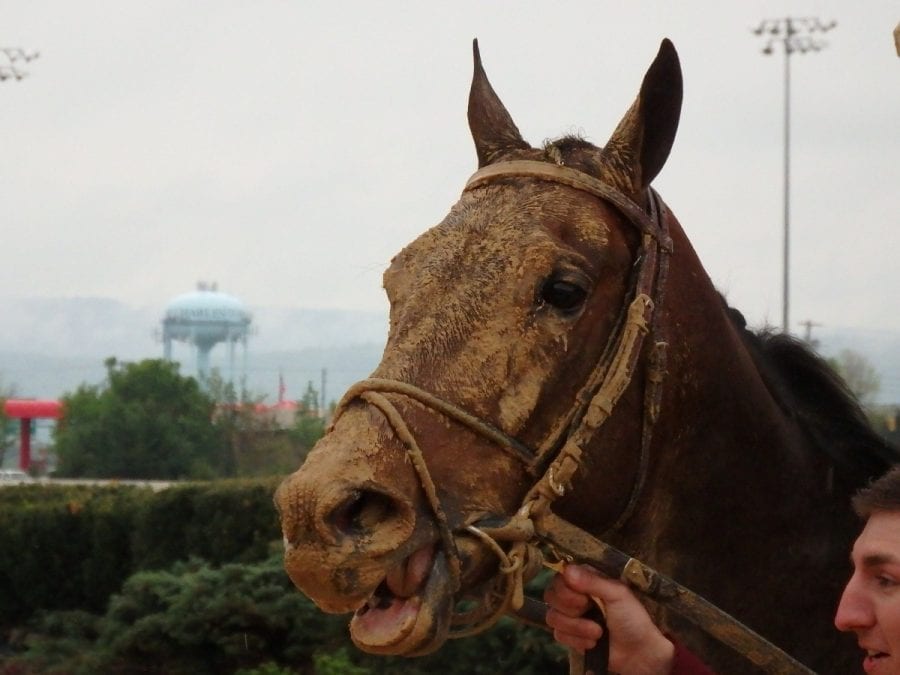Opinion: Approve the Charles Town stakes schedule

Imperative caught plenty of mud en route to winning the G2 Charles Town Classic. Photo by The Racing Biz.
by Frank Vespe
NEWS: The West Virginia Racing Commission on January 24 voted to reject Charles Town’s proposed stakes schedule. At issue: the Commission, particularly Commissioner Ken Lowe, a Shepherdstown native appointed by Gov. Jim Justice (R), believes that the $1.25 million purse of the Grade 2 Charles Town Classic is excessive.
VIEWS: In a rather extraordinary moment, West Virginia Governor Jim Justice (R) told the Charleston Gazette-Mail newspaper that he had asked his staff to look into ways to reverse the Commission’s decision to reject Charles Town’s stakes schedule.
What makes that so remarkable?
For one thing, for a Governor – just about any Governor anywhere – to weigh in publicly on a state Racing Commission decision is pretty unusual, and for one to call for a Commission decision to be overturned? That just about never happens.
What’s more, it was Justice’s two appointees to the Commission – Lowe and Anthony Figaretti – who voted to spike the Classic.
In the statement to the Gazette-Mail, Justice said, “I don’t dictate what my appointees do, but I am in support of the one big race, the Charles Town Classic. I have asked my staff to look into ways to have this decision reversed.”
And on this issue, Justice is right.
Classic day annually provides the track’s biggest wagering day, typically with two to three times as much money wagered as any other day.
Like many tracks, Charles Town has made major events – most prominently the Classic – the linchpin of its business strategy in recent years, its calling card in an increasingly nationalized horse racing market. And that strategy appears to be paying off.
Per-race handle has grown steadily in recent years, from about $77,000 in 2009 to nearly $139,000 last year. And last year, total handle on the track’s live product jumped to a shade over $190 million. That was up 19 percent from the prior year and was the highest gross handle for the track since 2013.
And make no mistake: good pari-mutuel results don’t just fill the track’s coffers; they also pour money into the purse account, which helps to pay for Charles Town’s everyday racing product.
It’s not as if Charles Town spends inordinate money on stakes races. By contract with the horsemen, just about eight percent of purse funds go to stakes races; that’s roughly half of the percentage used for stakes in neighboring Maryland.
And sure, the Classic purse is outsized as compared to everyday purses. In fact, it’s 54 times the purse of a maiden special weight race at the track. But that’s nothing all that unusual; in Maryland the purse of the Preakness is 37.5 times the value of a maiden special weight race.
The fact of the matter is that for Charles Town to hold a race with the panache of the Classic, it has to put a huge purse out there. Its nearest chronological competitor is the $750,000 Oaklawn Handicap, and Oaklawn has several advantages – including being a full-sized racing strip, offering huge purses, and, because of its three-year-old series of races, typically having a number of high-end barns on the grounds – that Charles Town has to overcome.
While Lowe has suggested he could live with the Classic at $300,000, the track has countered – correctly – that that’s not enough for the Classic to continue as such a high-profile event.
We know that’s not enough based on a couple of relevant races. Both the Charles Town Oaks – Charles Town’s second biggest race – and the Pimlico Special – which takes place over Preakness weekend just a month after the Classic – had $300,000 purses in 2017. Both are perfectly nice, Grade 3 races; but neither has had the overall quality or impact of the Classic in recent years.
No one can reasonably say whether $1.25 million is the right number for the Classic. Maybe it’s really $1 million or $900,000 – or $1.5 million.
But Charles Town has made a business decision that $1.25 million is the right number in the current environment. Business has been growing, and the horsemen have not opposed the Classic or sought a reduced purse.
While an assertive Commission can certainly be a positive force in a racing state, this case is one where agreement between the horsemen and the racetrack ought to carry the day. The Commission should approve the Charles Town stakes schedule.








Your editorial is right on the mark. I started going to Charles Town in the late 1980’s. The state and the track deserve one day to shine in the haze of $10K claimers and WV-breds. The only day I can get people to go to Charles Town with me is Classic day. And for two days and two nights, we dump a lot of money into area hotels, restaurants, the casino, and the track. Eliminate the Classic or geld it into a glorified Listed status, I’ll pass. My friends will try Laurel and the Preakness instead. And I’ll pass on Charles Town (and Mountaineer) in the future. Ken Lowe has managed to do something I never thought was possible….make me sympathetic to the plight of Penn National.